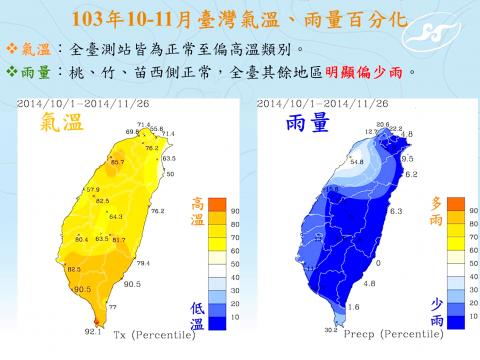Despite the recent spate of cold, wet weather, the Central Weather Bureau (CWB) is forecasting that the weather overall for this winter in Taiwan will tend to be mild and dry. The CWB has said that the coming winter will be mild, with rainfall being on the low side, and the occasional cold snap. The CWB emphasized that a mild winter did not mean that cold weather wouldn’t occur. Figures from the last two decades show that there have been, on average, 3.5 cold fronts coming over every year, anywhere from once to four or six times a year, and that January was generally the coldest, the month most likely to have cold snap.
According to the CWB’s Weather Forecast Center Director Cheng Ming-tien, the reason this winter is expected to be mild is because of the influence of ocean temperatures around the world this fall, which will make the winter warmer in general. Cheng emphasized that, although the winter will be mild on the whole, negative Arctic Oscillations mean that there will still be cold fronts or cold snaps over from the Asian mainland, and during the time this cold air effects Taiwan the temperature will plummet, and the public should be prepared for the cold when it comes.
(Liberty Times, translated by Paul Cooper)
雖然最近天氣轉為濕冷型態,但中央氣象局仍預估台灣今年冬天的天氣情況整體是偏暖少雨。氣象局指出,未來一季暖冬,且雨量偏少,偶爾會有寒流,但是氣象局強調,暖冬並不代表不會有寒流發生,根據近二十年統計,每年平均有三點五次寒流來襲,少則一次,多則四到六次,通常一月份最冷,最容易有寒流報到。

Photo courtesy of the Central Weather Bureau
中央氣象局提供
為什麼今年冬季偏暖?氣象局預報中心主任鄭明典表示,受到今年秋季全球海溫偏熱影響到冬季,因此造成今年冬季整體偏暖。鄭明典強調,雖然今年冬季整體偏暖,但在負北極震盪影響下,仍然會有大陸冷氣團或寒流來襲,一旦在冷空氣影響台灣期間,氣溫就會驟降,民眾別忘適時做好禦寒準備。
(自由時報記者林嘉琪)

A: Guess what’s included in Google Taiwan’s 2024 most searched words. B: Let me guess: Taiwan’s victory in the WBSC Premier 12 championship must be on the list. A: Wow, good guess. “Premier 12” is at No. 10. B: What are the other most popular searches? A: No. 9 to 6 are: Ticketing platform “Tixcraft,” Taiwanese film “The Pig, The Snake and The Pigeon,” Olympic gold boxer “Lin Yu-ting,” and the “Yuanta ETF coded 00940.” A: 猜猜看,Google 2024台灣搜尋排行榜,有哪些關鍵詞? B: 我猜「棒球12強賽」一定超熱門吧。 A: 你好強,12強真的排在第10名! B: 其他熱門搜尋有哪些?! A: 第9至6名是︰「拓元」售票、電影「周處除三害」、奧運拳擊金牌「林郁婷」、元大ETF「00940」。 (By Eddy Chang, Taipei Times/台北時報張聖恩)

A: Which words ranked highest for Google Taiwan’s most searched words of 2024? B: No. 5 to 1 are: “US presidential election,” “Olympics,” “Ko Wen-je,” “typhoon” and “earthquake.” A: I heard that Google also released a list of most searched word meanings. B: Yeah, the most popular searches included “M3,” “APT” and “release without bail.” A: Let me google their meanings now. A: Google 2024 台灣搜尋排行榜,前幾名是什麼? B: 第5至1名是︰「美國總統大選」、「奧運」、「柯文哲」、「颱風」、「地震」! A: 我聽說Google還有一個搜尋字義的排行榜。 B: 對啊前幾名是︰「M3」、「APT」、「無保請回」。 A: 讓我搜尋一下他們是什麼意思。 (By Eddy Chang, Taipei Times/台北時報張聖恩)

Stonefish may not be the most impressive-looking animal in the sea. In fact, this fish is so skilled at camouflage that most people wouldn’t notice it if they swam past it. Despite their unremarkable appearance, stonefish are the most venomous fish in the ocean. Stonefish come in various shades of brown, red, yellow, and orange. Their rough skin texture and blotchy color pattern give them a remarkable resemblance to stones, which is where their name comes from. This feature helps them blend in with their surroundings exceptionally well. Stonefish are notable for their 13 highly venomous spines which protrude

「雙手合十/合掌禮」(namaste) or 「碰肘/擊肘」 (elbow bump): 新冠肺炎流行逐漸改變現代社會的某些社交禮儀,歐美許多名人政要開始以「雙手合十/合掌禮」(namaste) 或「碰肘/擊肘」(elbow bump) 替代握手。 《今日商業》報導英國王儲查爾斯以「雙手合十」代替握手。 Coronavirus update: Prince Charles spotted greeting people with namaste (Business Today , March 12, 2020) 另外,《商業內幕》報導:疫情期間美國總統川普在白宮舉行新冠肺炎記者會,想和居家照護公司LHC集團執行副總葛林斯坦 (Bruce Greenstein) 握手,葛林斯坦婉拒,示意改用擊肘。 President Donald Trump attempted to shake hands with a home health care company executive . . . but the man turned the president down and offered him an elbow bump instead. (Eliza Relman, Business Insider , March 14, 2020) 「雙手合十/合掌禮」源自印度,也流行於泰、緬等國家。「碰肘/擊肘」則是 2006 禽流感、2009 豬流感後逐漸流行。疫情逐漸改變我們的生活方式,包括打招呼等社交禮儀,也出現了微妙的變化。 「拱手禮」(fist-and-palm salute) 至於華人社會傳統上也有雙手互握合於胸前「拱手禮」(fist-and-palm salute)。公益網站 Just Quarantine 提到: Taiwanese president Tsai Ing-wen demonstrating social distancing through use of a traditional Chinese greeting (fist & palm) instead of shaking hands in response to the COVID-19 pandemic. 因應新冠肺炎疫情,2020 當年總統蔡英文與來訪賓客保持安全距離,拱手 (fist &